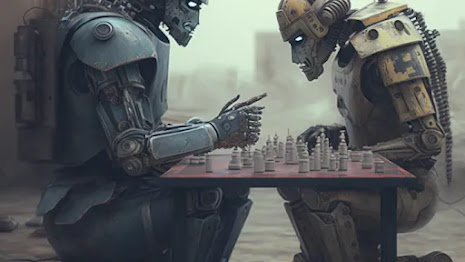Online search was last disrupted in its early days, at the dawn of consumer internet in the late 1990s. As the number of webpages exploded, useful information became harder to find.
A number of search engines, such as AltaVista and Yahoo!, made things a bit easier. But it was Google, founded in 1998, that revolutionised the industry.
Its algorithms ranked webpages based on the number of other websites linking to them, which turned out to be a good proxy for relevance. Then Google worked out it could display ads related to a search's keywords alongside the results.
NEAR THE bay in Mountain View, California, sits one of biggest profit pools in business history. The site is the home of Google, whose search engine has for two decades been humanity's preferred front door to the internet - and advertisers' preferred front door to humanity.
Every second of every day, Google processes perhaps 100,000 web searches - and, thanks to its clever algorithm, serves up uncannily relevant answers.
That power has turned Google into a verb. It also opens up billions of daily opportunities to sell ads alongside the answers to searchers' queries. The results' accuracy keeps users coming back, and rivals at bay : all other search engines combined account for barely a tenth of daily searchers.
Advertisers pay handsomely for access to Google's users, and are typically charged only when someone visits their website. The revenue of Google's parent company, now called Alphabet, has grown at an average annual rate of over 20% since 2011.
In that period it has generated more than $300 billion in cash after operating expenses, the bulk of it from search. Its market value has more than trebled, to $1.3 trillion. It's the world's fourth-most-valuable firm.
Unlike Apple and Microsoft, its bigger middle-aged tech rivals, it has felt no real need to reinvent itself. Until now.
The reason for the soul-searching in Mountain View is ChatGPT, an artificially intelligent chatbot designed by a startup called OpenAI. Besides being able to have a human-like conversation, ChatGPT and others like it can draft equally human-seeming poems, history essays, computer code and just about anything else that people write down.
UBS, a bank, reckons that since its launch in November ChatGPT has gained around 100 million monthly active users, a feat that had taken TikTok, the world's fastest-growing social media sensation, nine months.
Other ''generative'' AIS paint, compose or sing. Bill Gates, co-founder of Microsoft, has called the technology ''as important as the PC, as the internet.''
To Eric Schmidt, who used to run Google, ChatGPT is the ''first broadly visible example'' of what a human being's AI friend might look like. To his former employer, it is the first broadly visible threat to Google's search dominance.
For ChatGPT can also answer the sorts of questions that people might have asked Google. And ChatGPT's creator, OpenAI, has teamed up with Microsoft, which is covetously eyeing Google's gleaming pool of profits.
On February 7th Microsoft, which recently announced an investment of $10 billion in OpenAI, showed off how it plans to go after those profits. Results from the software giant's search engine, Bing, will now be accompanied by an AI-generated side box summarising pertinent information.
Bing will also get its own chatbot based on OpenAI'S models. Microsoft showed off neat tricks, such as making a shopping list based on a week of planned meals.
'' It is a new day in search,'' declared Microsoft's CEO, Satya Nadella.
Baidu, a top search engine in China, where Google is banned, will launch its own AI-boosted service in March. In a pre-emptive counterattack to steal some of Mr Nadella thunder, Alphabet this week unveiled its own chatbot, Bard, and has reportedly invested $300 million in Anthropic, a generative-AI startup.
On February 8th, while presenting some non-chatty AI search features, it confirmed that Bard will be integrated into search within weeks. Investors were unimpressed; Alphabet's share price tumbled by 8% after the announcement.
The battle of the bots is, then, brewing. It will transform the way people find things on the internet. In doing so, it may upend the lucrative business of search.
The Publishing continues. The World Students Society thanks author The Economist.

.png)


0 comments:
Post a Comment
Grace A Comment!